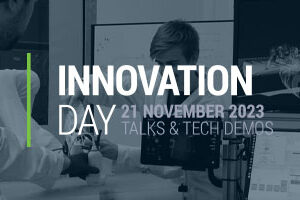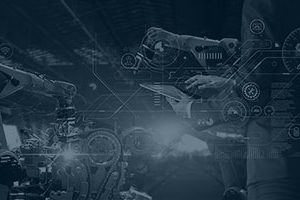Let’s face it, the economic downtime, high inflation, the Ukrainian war and, not so long ago, the COVID pandemic have had a profound effect on lots of industries. Widespread factory shutdowns, sustainable supply chains, reduced demand for goods, and pressure on margins are just a few of the new challenges companies are faced with. Innovation is your secret weapon to not only survive but thrive in times of uncertainty. So how are companies finding new ways to operate and embrace employee shortages? Our digital innovation team has been monitoring key digital trends in these industries, like a greater emphasis on automation and digitalization. Let’s take a look together!

Key trends in our focus industries
The initial wave of the pandemic resulted in widespread factory shutdowns and reduced demand for goods, leading to a decrease in production and a reduction in the supply chain. In addition, the pandemic has led to a shift in consumer behavior, with a growing focus on essential goods and a decrease in demand for non-essential goods.
In the wake of the pandemic, the manufacturing industry has had to adapt to new challenges and find new ways to operate efficiently while ensuring the safety of employees. This has led to a greater emphasis on automation and digitalization, as companies seek to reduce the need for manual labor and minimize the risk of virus transmission.
The conflict between Ukraine and Russia has also had an impact on the manufacturing industry in Europe. The ongoing conflict has led to disruptions in the supply chain and reduced access to raw materials and goods. In addition, the conflict has led to increased uncertainty and volatility in the market, making it difficult for companies to plan and operate effectively.
How to address the trends
To address these challenges, many companies in the manufacturing industry are seeking to diversify their supply chains and reduce their dependence on a single region or supplier. This includes investing in local production facilities and seeking out new suppliers in different regions. The use of artificial intelligence (AI) and machine learning algorithms (MLAs) has become increasingly widespread, as companies seek to optimize production processes, improve decision-making, and enhance the customer experience.
One of the major trends in the machinery industry during the pandemic has been the shift toward automation and digitalization. AI and MLAs have played a significant role in this trend by enabling the development of advanced automation systems and digital solutions that help companies to increase efficiency, reduce costs, and minimize the impact of disruptions caused by the pandemic.
AI algorithms have been used to optimize production processes and reduce downtime, improving the overall efficiency of the machinery industry. To illustrate with a few examples:
- Predictive Maintenance: Predictive maintenance is an AI algorithm that uses machine learning techniques to analyze data from machinery and predict when it is likely to fail. By detecting potential failures before they occur, companies can schedule maintenance during periods of low usage, reducing downtime and increasing efficiency.
- Process Optimization: AI algorithms can be used to optimize production processes by analyzing data from machinery to identify bottlenecks and inefficiencies. This can include identifying the optimal production speed, reducing waste and improving overall production time.
- Quality Control: AI algorithms can be used to monitor production processes in real-time to identify and flag any quality issues. By using image recognition, machine learning algorithms can detect deviations from product specifications, reducing the need for manual inspections and improving the accuracy of quality control.
- Supply Chain Optimization: AI algorithms can be used to optimize supply chains by analyzing data on inventory levels, production schedules, and shipping routes to reduce waste and increase efficiency.
In addition, the use of AI and MLAs has also contributed to the development of predictive maintenance solutions that help companies to reduce unscheduled downtime and reduce the need for inventory and spare parts. This has helped companies to remain competitive and maintain profitability even in the face of the challenges posed by the pandemic.
Another trend in the machinery industry has been the increased focus on supply chain resilience and security. The conflict between Ukraine and Russia has added to the complexity of the global supply chain, making it more important for companies to have access to reliable and secure supply chains. AI and MLAs have contributed to the development of advanced supply chain management solutions.
Download the perspective to read more examples on the importance of innovation in times of uncertainty




